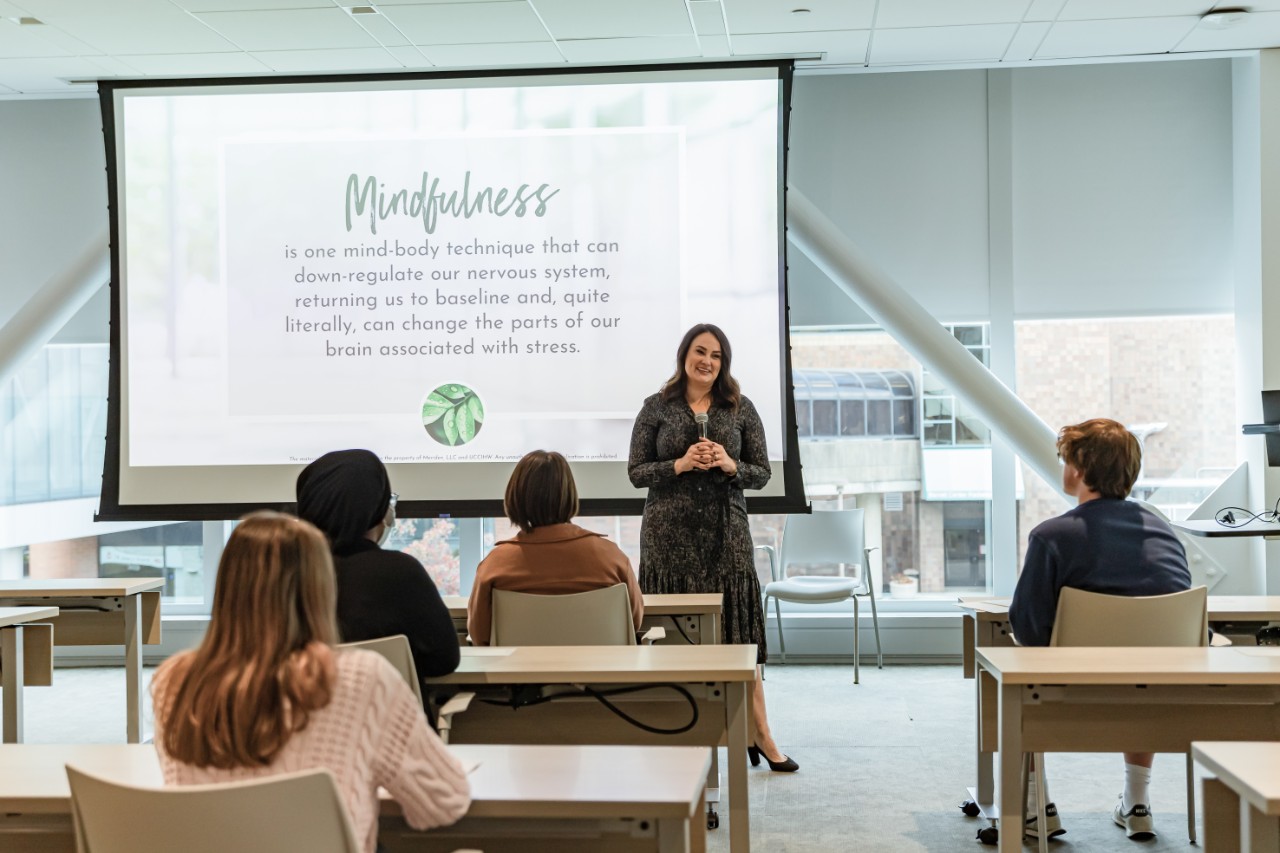
Cultivating mindfulness on the job
UC staffer offers tips for workplace culture change
Just how stressed out are employees today?

Meriden McGraw, director of workplace mindfulness at the University of Cincinnati’s Osher Center for Integrative Health.
So stressed that the World Health Organization has dubbed it the "health epidemic of the 21st century.”
A primary cause of workplace stress is information overload. Most of us are bombarded with communications from various channels, including emails, private messages, video calls, phone calls and team chats. Whether at work, home or on the go, these notifications follow us everywhere on our mobile devices, serving as a near-constant distraction.
That’s where mindfulness comes into play. Mindfulness is a state of mind in which we are fully aware and present in the moment, allowing us to focus on the task at hand. It’s a quality that can be cultivated with practice, said Meriden McGraw, director of workplace mindfulness at the University of Cincinnati’s Osher Center for Integrative Health. A certified MSBR (mindfulness-based stress reduction) teacher, McGraw uses her master's-level education in mental and public health along with training in mind-body modalities to teach techniques for optimal wellbeing.
This mental training, derived from ancient techniques and validated by modern science, offers an alternative to habits of worry, anxiety and frustration, increasing happiness and productivity.
Meriden McGraw Director of workplace mindfulness, Osher Center for Integrative Health
Benefits of practicing mindfulness
According to McGraw, the regular practice of mindfulness can lead to positive changes in up to eight parts of the brain associated with a fight-or-flight stress response. That can mean:
- Better emotional regulation
- Improved rationalization and reasoning
- Better mental clarity, insight and understanding
- Enhanced focus and productivity
“This mental training, derived from ancient techniques and validated by modern science, offers an alternative to habits of worry, anxiety and frustration, increasing happiness and productivity,” McGraw said.
Promoting mindfulness at work
As McGraw noted, mindfulness goes beyond checking the box — “We did one session, now we’re done.” She offers the following tips to cultivate mindfulness at work:
- Engage in group mindfulness sessions to facilitate culture change.
- Be sure that leadership buys in to the idea so that you have support and adequate resources.
- Don’t fall for the trap that you simply don’t have enough time. Practicing mindfulness saves time, allowing you and your colleagues to return to your workday feeling refreshed, productive and focused.
- Tap into available resources at work. At UC, those include Midday Mindfulness in the 1819 Innovation Hub and mindfulness tools and programming through the Osher Center for Integrative Health.
Featured image at top: Meriden McGraw conducts mindfulness training session. Photos/Andrew Higley/UC Marketing + Brand
Learn more about mindfulness
Learn more about Midday Mindfulness at the 1819 Innovation Hub and mindfulness programs at the Osher Center for Integrative Health. Or, email an Osher coach or facilitator.
Related Stories
Creating a culture of ‘Calm’
April 26, 2023
The University of Cincinnati uses mindfulness to help professionals navigate organizational turbulence. Businesspeople today receive an onslaught of digital notifications pinging simultaneously across multiple devices. Meriden McGraw, director of workplace mindfulness, Osher Center for Integrative Health, shares how mindfulness and productivity are interrelated.
Cultivating mindfulness on the job
April 27, 2023
A primary cause of workplace stress is information overload. Most of us are bombarded with communications from various channels, including emails, private messages, video calls, phone calls and team chats. Whether at work, home or on the go, these notifications follow us everywhere on our mobile devices, serving as a near-constant distraction.
Upcoming webinar helps UC faculty get funding for commercialization
May 31, 2024
University of Cincinnati faculty and staff can learn how to secure funding for product commercialization by attending a June 5 webinar hosted by the Venture Lab and Tech Transfer teams.
